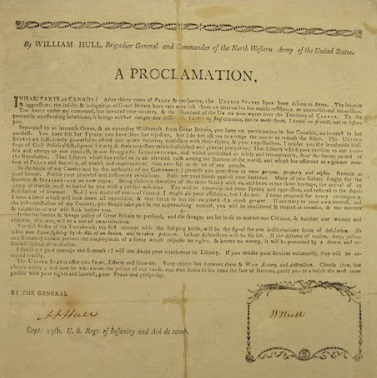How did a war over British violations of American maritime rights come to encompass a land invasion of Canada? Did the Republicans intend to conquer and keep Canada permanently, or did they intend to use it as a bargaining chip with Britain?
“If the object of the war was the conquest of Canada, the Administration ought to have openly avowed it." Federalist Congressman Elisha R. Potter

The Clements Library, University of Michigan http://clements.umich.edu/
The primary impetus for waging war against Great Britain revolved around maritime issues. Why, then, did Republicans decide on invading Canada with land forces? Was there a plan to keep Canada, or did they hope to use it as a bargaining chip in negotiations with the British?
The Americans had a limited range of options upon embarking on a war against one of the world’s great superpowers. Since several of America’s war aims focused on maritime issues (ending the practice of impressment and stopping British interference with neutral shipping), some politicians from both parties recommended pursuing a limited war on the high seas. But the majority argued that contesting Britain’s maritime supremacy with just a handful of American warships would be a futile effort.
With little hope of besting the British in a naval war on the Atlantic, only the conquest of Canada remained as a way to force Britain to negotiate concessions. Canada’s apparent vulnerability—Jefferson had famously suggested that its conquest would be “a mere matter of marching” for American troops—made it an even more enticing target. But Republicans were divided over what they might do with Canada after conquering it.
Some believed that the conquest and acquisition of Canada believed that part of America’s destiny on the continent was to expand to the north. Other Republicans saw Canada in more functional terms. To them, the acquisition of Canada would provide some compensation for America’s commercial, material, and manpower losses. Acquiring Canada permanently would help make America more secure, as well, by severing connections between the British and their native allies. Those alliances had long been frustrating to Americans hoping to expand the nation westward.
But still other Republicans questioned the wisdom of permanently absorbing Canada. Southern Republicans in particular worried that Canada would eventually become a collection of non-slave states. Adding new free states without a concurrent expansion in the South threatened to disrupt the regional and political balance of power.
The idea of taking permanent possession of Canada became a divisive issue within the Republican party. As a result, Republicans avoided formulating a concrete proposal regarding their plans for Canada should the U.S. complete its conquest.
But the lack of a formal policy alienated many Canadians living in the north. Some of those might have welcomed the American invasion if provided assurances that their homes were more than just a diplomatic bargaining chip in America’s struggle with the British.
One Federalist, Congressman Elisha Potter, pointed out the flimsiness of Republican policy by noting that “If the object of the war was the conquest of Canada, the Administration should have openly and honestly, and avowed it….and have pledged themselves to the Canadians that they would not lay down their arms until it was effected.” Such an assurance, Potter noted, would give the Canadians “something to depend upon.” As it stood, the Americans undertook their invasion with no formal plans as to what they would do if it succeeded.
Last updated: May 24, 2016
